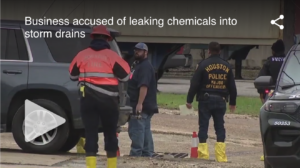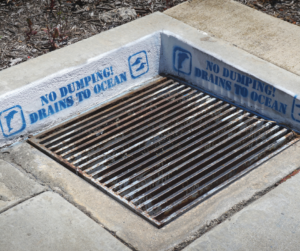A few nights ago, I saw this story on Houston’s local Fox affiliate on channel 26. Houston business accused of leaking chemicals illegally into storm drains, hazmat investigates. Being an environmental issue, it piqued my interest. Quite frankly, I was surprised to see that this was a story in the first place as it is a fairly common occurrence, especially on a small scale as this appears to be. As of yet, no charges have been filed as the discharge in question hasn’t been identified. The business looks like a machine shop, so the chemical is most likely cutting fluid. In our business, we see this kind of activity more often than I’d like to admit. When I told my staff about this story, everyone gave a similar example: from the donut shop with an inlet at the back door that receives a lot of grease to the 5 Guys that regularly dumps “something” into the storm drain behind the building. I suspect the employees of these establishments are unaware of the law. But as we all know, ignorance is not a defense in a criminal action.
The law (regardless of where you’re in the United States) is that NOTHING but rainwater and potable water can be discharged into a storm drain. So if you are putting anything other than these items (even mop water) in the storm drain, intentionally or accidentally, you are committing a crime. Anything (except grease or hydrocarbons) that aren’t stormwater or potable water can be discharged into the sanitary system. Any fat should always be contained in an approved outdoor oil dumpster and serviced regularly.
The penalties for such offenses are fines and clean-up costs. Those clean-up costs can be staggering as the discharge may have traveled for miles, and the offender would be responsible for the entire clean-up, not just on their property. Contact us (or the TCEQ) if you are unsure. Here is a link to the EPA website explaining allowable discharge into the storm sewer. The drain is just for rain.


